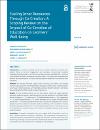Fueling Inner Resources Through Co-Creation: A Scoping Review on the Impact of Co-Creation of Education on Learners' Well-Being

View/
Date
2025Author
Suliman, ShireenIqbal, Muhammad Zafar
Bishawi, Abdel Hakim
Allen, Margaret
Könings, Karen D.
Metadata
Show full item recordAbstract
Introduction: Co-creation is gaining momentum in health professions education with positive effects on learners' engagement and motivation. Concurrently, emotional challenges faced by learners-such as stress, anxiety, burnout, and depression-continue to be a problem for health professions education leaders. This review seeks to explore how learners' active participation in shaping their educational experience may influence their well-being. Methods: We searched MEDLINE, Scopus, Web of Science, and CINHAL. We included studies conducted within a health professions education context, which involved learners in curriculum design processes, and reported outcomes related to learners' well-being. We used Seligman's PERMA model to report these terms. Results: Of 4222 reviewed articles, 24 met the inclusion criteria. All studies reported outcomes related to learners' well-being across the five domains of the PERMA model: Positive Emotions (n = 23), Meaning (n = 20), Positive Relationships (n = 10), Engagement (n = 4), and Accomplishment (n = 4). Studies describing a true student-staff partnership approach (n = 17) involved smaller learner groups, focused on developing new curricula reported outcomes related to learners' positive well-being in all five domains. Studies describing pseudo-partnership (N = 7) also reported positive learner well-being, but not in all domains, and mostly focused in the context of developing extracurricular mental health initiatives. Conclusions: Co-creation, especially when true student-staff partnership is used, can have a positive influence on learners' well-being. This underscores the importance of empowering learners to participate in shaping their education. Lessons learned from this review may encourage curriculum planners and education leaders to create opportunities and initiatives for involving learners in the design of their education.
Collections
- Medicine Research [1891 items ]

